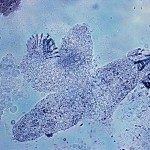Présentation
The TIPTOP project provides the opportunity to evaluate the impact of SP delivery as part of IPTp on the development and spread of SP resistance, by comparing the prevalence of key mutations in Pfdhfr and Pfdhps genes in samples collected from areas where IPTp has been implemented at community level with those where IPTp is delivered at ANC clinics only. The repeated surveys over time (baseline vs. end-line samples and possibly mid-term samples) should define the degree and speed with which IPTp implemented at community level drives resistance to SP. In order to obtain the required data to guide future WHO policy reviews, adequate and rigorous laboratory processes need to be deployed to conduct such analyses on time. To this end, we have developped a complete laboratory workflow to determine Pfdhfr mutations located at codons 108, 51, 59, 164 and Pfdhps mutations located at codons 431 (specific to Nigeria), 437, 540, 581, and 613 on blood samples collected onto filter paper (dried blood spots, DBS). Designed by combining state-of-the-art molecular biology technics and bioinformatics analysis pipeline, our high throughput format analytical approach enables to test rigorously thousands of dried blood spots in several weeks, at the lowest cost.


